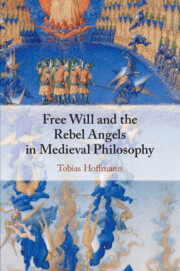Book contents
- Free Will and the Rebel Angels in Medieval Philosophy
- Free Will and the Rebel Angels in Medieval Philosophy
- Copyright page
- Dedication
- Contents
- Acknowledgments
- Abbreviations
- Citation Method
- Introduction
- Part I Free Will
- Part II Whence Evil?
- Part III Angelic Sin
- Chapter 8 Intellectualist Accounts of the Angelic Fall
- Chapter 9 Voluntarist and Intermediary Accounts of the Angelic Fall
- Chapter 10 Necessary (and Free?) Obstinacy
- Conclusion
- Bibliography
- Index of Manuscripts
- Index
Chapter 9 - Voluntarist and Intermediary Accounts of the Angelic Fall
from Part III - Angelic Sin
Published online by Cambridge University Press: 26 November 2020
- Free Will and the Rebel Angels in Medieval Philosophy
- Free Will and the Rebel Angels in Medieval Philosophy
- Copyright page
- Dedication
- Contents
- Acknowledgments
- Abbreviations
- Citation Method
- Introduction
- Part I Free Will
- Part II Whence Evil?
- Part III Angelic Sin
- Chapter 8 Intellectualist Accounts of the Angelic Fall
- Chapter 9 Voluntarist and Intermediary Accounts of the Angelic Fall
- Chapter 10 Necessary (and Free?) Obstinacy
- Conclusion
- Bibliography
- Index of Manuscripts
- Index
Summary
Chapter 9 examines explanations of the angelic fall by voluntarists and thinkers holding an intermediary theory of free will. These nonintellectualist accounts agree – contrary to intellectualists – that there was deficient willing before there was deficient cognition. For some voluntarists, the discussion of angelic sin serves above all as confirmation of their own theories of free will (e.g., Henry of Ghent) or as proof that their adversaries are wrong (e.g., John Pecham). Others go further and try to give a plausible account of how the evil angels could intentionally make their choice (Peter Olivi), and to explain how their will could be defective while their cognition was unflawed (Duns Scotus). Among thinkers professing an intermediary theory of free will, the chapter considers Giles of Rome, whose account of angelic sin fits nicely with his general theory of the relation of ignorance and evil, and Peter Auriol, whose explanation of angelic sin does not sit comfortably with his theory of free will.
- Type
- Chapter
- Information
- Free Will and the Rebel Angels in Medieval Philosophy , pp. 219 - 242Publisher: Cambridge University PressPrint publication year: 2020

